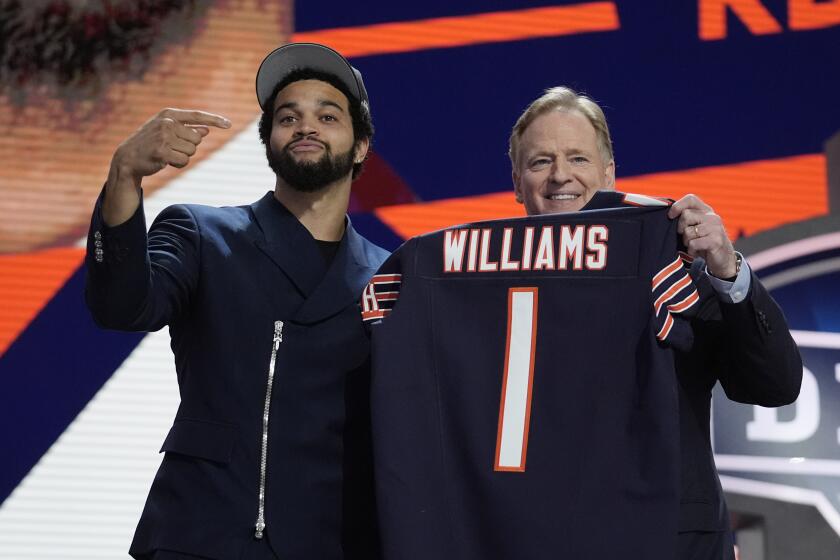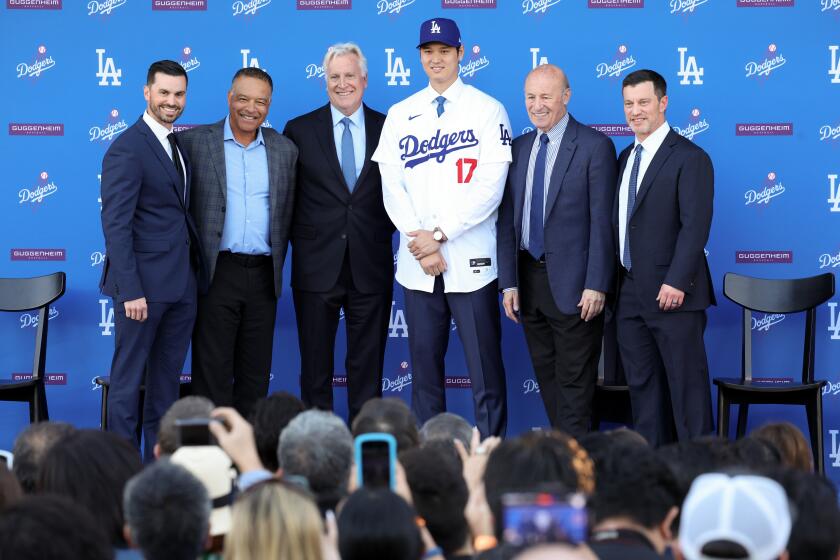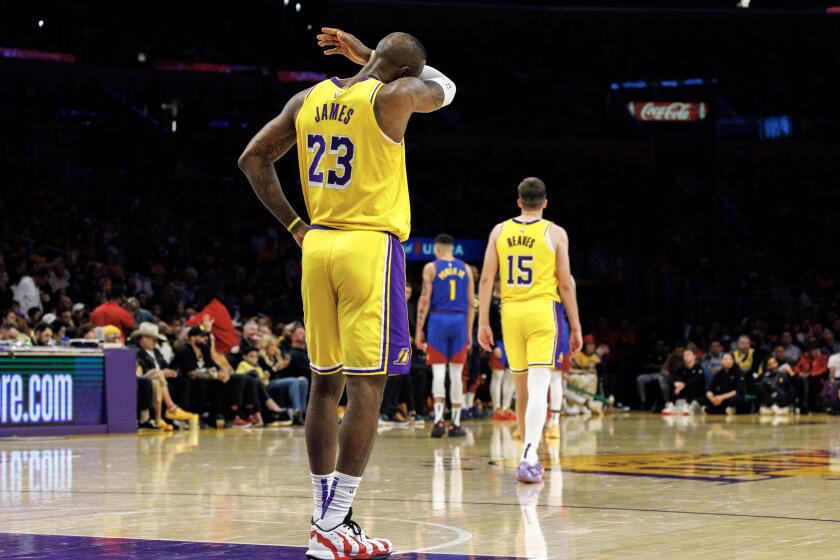Soccer newsletter: Germany is playing, so which country will be next?
Hello, and welcome to another edition of the L.A. Times soccer newsletter. I’m Kevin Baxter, The Times’ soccer writer, and we begin today in Germany, where professional soccer made a quiet return from its pandemic-induced quarantine over the weekend.
All 18 first-division team played between Saturday and Monday, the first games for a major European league in more than two months. And they were all played behind closed doors, which made for a strange television experience; players could clearly be heard calling to one another and spectacular plays were greeted not with a cheer but with an echo through the empty stadiums.
“There’s no noise. You create a chance, you play a great pass, a goal and ... nothing. It’s very, very weird,” Borussia Dortmund coach Lucien Favre said in the virtual news conference after his team’s 4-0 win over Schalke in a Revierderby match. “We miss our fans very much. It was just a very different match.”
Under normal circumstances the Bundesliga has the second-highest average attendance of any professional sports league in the world, trailing only the NFL. But if nobody was watching the games in person last weekend, there were a lot of viewers at home with Saturday’s games drawing 3.68 million viewers to subscription TV channels in Germany, twice the normal audience for a Saturday. Another 2.45 million watched simultaneous live coverage of the five afternoon games, with the coverage moving from stadium to stadium.
And with some 70 broadcasting companies carrying the games internationally to a world starved for live sports, Bayern Munich CEO Karl-Heinz Rummenigge predicted the matches would draw 1 billion viewers worldwide, a major boost for a league that typically trails far behind the English Premier and Spain’s La Liga.
Enjoying this newsletter? Consider subscribing to the Los Angeles Times
Your support helps us deliver the news that matters most. Become a subscriber.
It wasn’t exactly compelling viewing though. The lack of a stadium ambience – most notably Borussia Dortmund’s silent Yellow Wall – left the matches feeling more like Sunday pick-up games at the park. And the echoes added to the strangeness.
“It felt a bit like the atmosphere you get for old man’s football,” Bayern’s Thomas Mueller told the league’s website. “Seven p.m., under floodlights. But as soon as the ball started to roll, the game took our focus. There were a few butterflies before the restart, wondering how it would go, like before the first game of the season in August.
“I wasn’t worried about anything going wrong, everything was explained clearly to us. No handshakes before kick-off etc.”
In addition to the empty, passionless stands there were a number of other things that made the resumption of the Bundesliga different from where we left off in mid March. Teams were allowed five substitutions, not three, and FIFA gave the league the option of playing without VAR – an option it declined.
With social distancing urged even on the pitch, goal celebrations lacked the normal hugging and even handshakes in favor of fist and elbow bumps. Facial coverings had to be worn in the dressing rooms, the tunnel and on the bench, ball boys wore gloves and had to be tested for COVID-19, TV reporters wore masks and placed plastic sheets over their microphones, and teams were encouraged to disinfect match balls before and after the game.
For some teams there was also a lack of offense, with one game ending scoreless and three other teams getting shut out.
One player who wasn’t kept off the scoresheet was Bayern’s Robert Lewandowski, who scored the first goal in a 2-0 win at Union Berlin on a penalty kick. The goal was his 40th of the season in all competition, making him the third player – behind Lionel Messi and Cristiano Ronaldo – to score 40 times in five consecutive seasons while playing in a major European league.
Messi has done it 10 seasons in a row, although that streak could end this year with La Liga still suspended with 11 games left on its schedule.Who will be next? England, Spain or Italy?
Three other European leagues could resume play in empty stadiums in the next month after the English Premier League’s organizing body unanimously agreed Monday on a set of health protocols that would allow its teams to begin small-group workouts Tuesday.
Both Spain’s La Liga and Italy’s Serie A have also opened their training centers to individual or small-group workouts. All three leagues hope to resume games in mid-June, but each has several hurdles to clear first.
In Italy, the first European country to be ravaged by the novel coronavirus, what was expected to be the start of full training this week was postponed as teams continue to negotiate with the government over medical procedures. According to media reports, the main beef centers on the government’s insistence that a positive test for one player means that player’s entire team must go into quarantine for 14 days. The clubs want to simply isolate the infected player, arguing that sidelining entire teams would make it impossible to finish the season by August.
Teams are also opposed to the requirement that each squad, including coaches and backup staff, train in isolation before the league restarts, saying it would create logistical issues.
In Spain, teams began training in groups of up to 10 players Monday. Before that first tentative step could be taken, players had to submit to COVID-19 testing with five players in the top two divisions testing positive. As long as that number remains low, players and staff will be able to return to their families each night rather than being quarantined at the training site.
The next step for the league is to transition into normal full-team training sessions. League president Javier Tebas is hoping for a June 12 return to play.
The EPL is also eyeing a June 12 restart although a number of coaches believe the accelerated schedule will not give them enough time to prepare; they have proposed waiting until June 19. Results of leaguewide coronavirus testing will be known Tuesday afternoon and if the numbers are low, teams will be able to begin non-contract training in small groups.
France’s Ligue 1 was shut down by the government last month.MLS Florida plan in state of confusion
There are still way more questions than answers surrounding Major League Soccer’s plan to relocate its 26 teams to a Disney resort in Orlando, Fla., next month to resume play under quarantine conditions.
That uncertainty has already led the league to move the target day for the start of Camp Quarantine from June 1 to June 8 -- and even that seems a bit optimistic.
“It will be challenging,” one Western Conference general manager said.
But the league may have no choice. Earlier this month it took a tiny baby step toward returning when it cleared teams to open their training facilities to players for voluntary workouts on isolated quadrants of an outdoor field under strict social-distancing requirements.
Nearly two weeks later seven teams have yet to receive permission from local health authorities to proceed. So while governors in several states with MLS teams, including Texas and California, have said they anticipated allowing professional sports to return, without spectators, by June, the league can’t expect teams to play games at home if more than a quarter of them can’t even train at home.
Hence the invitation for everyone to go to Disney World.
Another equally unrealistic part of the league’s proposal is the one that limits teams to two weeks of individual workouts and a week of team training before games resume. Since no team has had a full practice since March 12, that time frame is far too short for teams to be fully prepared.
“A normal preseason is about eight weeks but obviously we have to modify things if we’re allowed to so that we can start playing games,” said midfielder Sacha Kljestan after the Galaxy held their first voluntary individual workouts last week. “I think you give me three to four weeks and I’ll be ready to play a game.”
But that’s too much time – time MLS won’t have once it gets to Florida since the teams will be quarantined away from family and friends.
Details about the blueprint for the league’s return, which is still evolving, have not been publicly revealed. But here are the broad outlines:
--Teams would be housed at a massive resort in Florida, whose governor, Ron DeSantis, has not only declared sports an essential business, but held a news conference last week openly begging leagues to come to his state – even calling out MLS by name.
--More than 1,000 people would be kept inside a protective bubble, where they would be tested for COVID-19 multiple times a week. Players and staff would be separated from family and friends during the quarantine, which could last up to 10 weeks.
--Televised games will be played without fans and under strictly controlled conditions at ESPN’s Wide World of Sports complex. A tournament format is being discussed.
Let’s address those one by one.
Florida, despite the governor’s boasts, isn’t totally safe. DeSantis has largely ignored the advice of health experts, trailing many governors in ordering state-at-home edicts, then quickly lifting those he did enact. On Monday, the first day Miami-Dade and Broward counties were cleared to reopen business, the state’s department of heath confirmed 854 additional COVID-19 cases statewide.
Orlando is located 215 miles north in Orange County.
As of midday Monday, Florida had a total of 46,434 confirmed COVID-19 cases – ninth-most in the U.S. -- and 1,996 deaths, the country’s 11th- highest total. But those numbers may be misleading since a Florida-based health care system said Saturday that the results of more than 35,000 tests it ordered are unreliable.
So it was something of an embarrassment when the state cleared the way for a UFC card in an empty arena in Jacksonville earlier this month, only to have one fighter, Brazilian Ronaldo “Jacaré” Souza, withdraw after he and two cornermen were found to have been infected with the virus.
MLS can’t afford that kind of mistake. While UFC has held three events in Florida since Souza was sidelined, one positive test could scuttle the whole MLS experiment by leaving everyone in the quarantine bubble subject to infection.
Which brings us to the quarantine. MLS can’t go ahead with its plan to play in Florida without approval from the union, and the players appear deeply divided on the idea.
Safety is one concern, with players asking a) how the league can truly keep them from getting infected and b) what happens if one person inside the bubble does test positive?
Many are also hesitate to spend up to 10 weeks cut off from family and friends – a big reason why the MLS is pushing for a very limited training camp despite the risk of injury and the impact that could have on the quality of play. The less time in quarantine, the more appealing the plan.
MLS believes it has more carrots and sticks to win the players over. The league, whose top executives took a 25% salary reduction a month ago, have proposed players take a huge pay cut across the board. Additionally, the league has yet to ratify the collective bargaining agreement it agreed to last winter.
Steve Goff of the Washington Post and Jeff Carlisle of ESPN reported Monday that the players association submitted a counter-proposal over the weekend that would provide the league with more than $100 million in relief through salary cuts, reductions in bonuses and pay deferrals. Those concessions represent about a third of the total league-wide payroll but it’s just two-thirds of the $150 million in relief MLS was seeking.
It’s no surprise that ESPN and Disney, its parent company, are playing roles in the proposed MLS reopening. With Disney’s theme parks closed for at least six more weeks, the company’s earnings dropped 63% during the last fiscal quarter. The COVID-19 shutdown has impacted every corner of the company, from movies to live shows. And with few sports to air, ESPN has struggled for programming.
MLS can’t solve all that but it can help by filling at least one large Disney resort and offering ESPN and ABC, another Disney property, live games to air.
In the grander scheme of the things, however, the Orlando plan, even if it lasts 10 weeks, is just a stopgap measure for Disney and ESPN, both of whom can see a return to normal on the horizon. Disney’s Florida resorts have already started taking reservations for the summer in the hopes of reopening its theme parks in July while baseball and the NBA appear to be nearing agreements of their own to resume play and NFL training camps could open soon, once again crowding ESPN’s broadcast schedule.
As for the league, which counts ticket revenue as one of its leading sources of income, the hope is teams will return to their local markets in mid-summer to play in front of their fans again. At the moment, that appears the most unlikely part of the plan.
While MLS teams in Florida, Kansas and other states with relaxed state-at-home guidelines can look forward to playing in their stadiums this summer, those in places like New York, Illinois and Massachusetts are still waiting for permission to access their training sites.
It could be a long wait, leaving the Orlando plan, imperfect as it may be, the best chance for MLS to make a speedy return.Here’s another tradition you can kiss good-bye
Speaking of COVID-19, the long South American tradition of kissing the ball for good luck won’t survive the coronavirus pandemic. Nor with the exchanging of jersey and spitting or blowing your nose on the field.
CONMEBOL, the ruling body for soccer on the continent, outlawed all that stuff last week when it released a series of specific regulations to be implemented when – if? -- the Copa Libertadores tournament resumes.
There is no date set for the tournament to restart. The Copa Libertadores and the second-tier Copa Sudamericana were suspended, along with most other professional sports, in March.
CONMEBOL also mandated that all players have their temperatures checked before the matches and will require everyone on the bench to wear a mask at all times. Players and the coaching staff will be obligated to use individual water bottles during games.At least they sat six feet apart
Not content to play its home games in front of empty seats, a South Korean soccer club decided to fill those seats with mannequins last weekend -- only to be forced to apologize when some of those ersatz supporters turned out to be sex dolls.
FC Seoul expressed “sincere remorse” over the controversy during Sunday’s 1-0 win over Gwangju FC at the Seoul World Cup Stadium.
The team said it was attempting to add “an element of fun” and was repeatedly reassured by Dalkom, the company that produced the mannequins, that they weren’t sexual products. Nearly all the dolls/mannequins the company placed in the stadium were female, according to reports from Seoul.
Podcast
Don’t miss my weekly podcast on the Corner of the Galaxy site as co-host Josh Guesman and I discuss the Galaxy each Monday. You can listen to the most recent podcast here.
Quotebook
“We want to safely return but it’s not the same unless everybody is there with us. And the environment we had is one which we cherished so we would love to have it back one day. So even if some think that they’re unwanted or nonessential, we know that without them the club wouldn’t be the same — whether you’re a sales assistant or an athletic trainer.”
Real Salt Lake defender Nedum Onuoha in the Salt Lake Tribune. Onuoha, supported by some teammates and coaches, led an effort to send money, from his personal checking account, to around 90 RSL employees who were furloughed or laid off by the club after the season was suspended due to COVID-19 in March
Until next time...
Stay tuned for future newsletters. Subscribe here, and I’ll come right to your inbox. Something else you’d like to see? Email me. Or follow me on Twitter: @kbaxter11.
Get our high school sports newsletter
Prep Rally is devoted to the SoCal high school sports experience, bringing you scores, stories and a behind-the-scenes look at what makes prep sports so popular.
You may occasionally receive promotional content from the Los Angeles Times.




